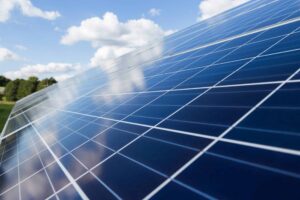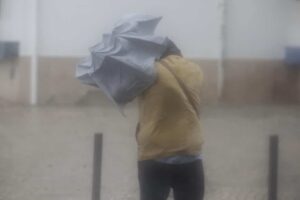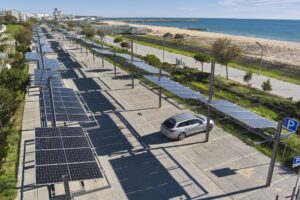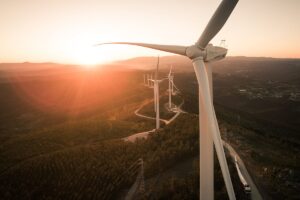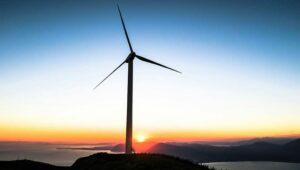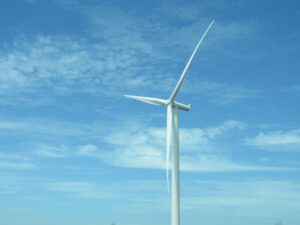By COLIN REID energy@algarveresident.com
Colin Reid is the technical director at the Enova Group and is a chartered engineer specialising in renewable and sustainable energy systems. He has over 20 years experience in the industry and lives with his wife and three children near Almancil.
OUR FIRST article is a general introduction to alternative energy, providing an overview of the technologies available, other aspects of a building to consider during design and forthcoming legislation.
The main forms of alternative energy that can be applied on a residential level in the Algarve are:-
Thermal solar Solar panels provide a minimum heating energy for sanitary hot water (showers, basins, baths, etc.). These systems can be expanded to provide additional hot water for space heating (particularly under floor heating) and pool heating. The panels are normally mounted on the roof but where space is available they can also be mounted in the garden.
Geo-thermal Underground pipes can be used to harness the earth’s energy for space heating and cooling. Fresh air is cooled via underground ducts and fed into the building via floor or wall grilles. In conjunction with careful architectural design and quality construction, this provides cooling without the need for mechanical refrigeration. This system can also be used for preheating air during winter thus reducing winter fuel bills.
Ground source heat pumps Underground pipes in conjunction with heat pumps can be used to provide space heating and cooling. These systems provide more controlled heating and cooling. They operate in a similar fashion to normal heat pumps except they are water cooled as opposed to air cooled. Energy is withdrawn from the ground as opposed to the air via sealed water circuits in the earth. They are more efficient than their standard air cooled counterparts.
Power generation This technology is becoming more and more financially attractive as the electricity generated can be sold back to the national grid as well as providing electricity for consumption. The main systems comprise:
Photovoltaic solar panels which generate electricity with batteries to store the energy if required;
Wind turbines to generate electricity which is normally used in conjunction with photovoltaic panels and a back-up generator where no grid power is available;
CHP generators (combined heat and power units) which generate heat for hot water and power for electricity – well-known for commercial applications but now becoming more popular on residential projects.
Carbon neutral fuels Fuels such as biomass pellets have two advantages: firstly they are cheaper than alternative fossil fuels such as oil and gas, and secondly, they are carbon neutral (the carbon emitted during burning is balanced by the carbon absorbed during production).
They are used in biomass boilers for heating and hot water and can also be used with CHP generators for heating and electricity generation.
Water conservation
Rainwater can be collected from roofs and gardens and reused for irrigation.
Grey water (waste water from basins, showers and baths) can also be gathered in tanks, treated and then stored for irrigation. It is also possible to recycle black water (sewage) by treating the waste on site and reusing the water produced for irrigation.
Borehole water systems provide back-up water for irrigation.
Lighting
Careful planning and design of lighting systems ensures low energy consumption which apart from the obvious advantages of lower utility bills and lower CO2 emissions, also reduces heat gains which in turn reduces air conditioning loads.
Low energy fittings, particularly LED’s (light emitting diodes), should be employed and automatic control of lighting is paramount connected to movement and lighting level sensors as well as time switches.
Other aspects
Alternative energy is only part of the overall picture. We also need to design the building and the mechanical and electrical services within to reduce CO2 emissions.
There are two further important areas:
Energy efficiency
Heat recovery – reusing heat which is rejected from systems such as air conditioning or extract ventilation;
Heat pumps – more efficient than other forms of heating;
Low energy lighting – as mentioned above;
Automatic control systems – temperature and time control as a minimum.
Building design
Natural ventilation – designing the building to allow fresh air in naturally and exhaust air out. This can also provide a degree of passive cooling thus reducing mechanical air conditioning;
Natural lighting – again designing the building to allow natural light. This will reduce the demand for additional lighting during the day;
Passive solar heating – designing windows and roof lights to maximise solar gain during winter;
Thermal insulation – proper insulation and glazing to reduce heat losses during winter and heat gains during summer;
Solar shading – designing the building to shade the windows from summer sunshine to reduce heat gains during summer (but still allowing the solar gain during winter);
Natural gardens to promote the production of oxygen and reduce levels of CO2.
Legislation
There is a vast quantity of legislation which is evolving and changing all the time.
It is now a legal requirement to install solar panels for sanitary hot water on all new buildings – the general rule is one square metre of solar panel per person.
The number of persons is calculated from the number of bedrooms (N) and is equal to N+1. So, for example a T3 apartment would be classed as four people and thus require four square metres of solar panels (normally two panels each two metres square).
As of July this year, all new buildings over 1,000 square metres now require energy certification (this will involve a separate design project for the municipality during design stage and a certificate after construction).
Without this in place, projects will not be accepted by the câmara and building licences will not be granted. As of January 2008, all new buildings less than 1,000 square metres will require energy certification and as of January 2009, all existing buildings will require energy certificates. This is probably the most important for many clients as without this certificate, it will not be possible to sell nor even rent a property.
In next month’s article, we will look at solar panels in more detail including the advantages and disadvantages of the panels available and the systems to install.
Colin Reid can be contacted by phone on (00351) 282 960 969 or by email at energy@algarveresident.com. To visit the Enova Group website, click on the link to the right of this page.

